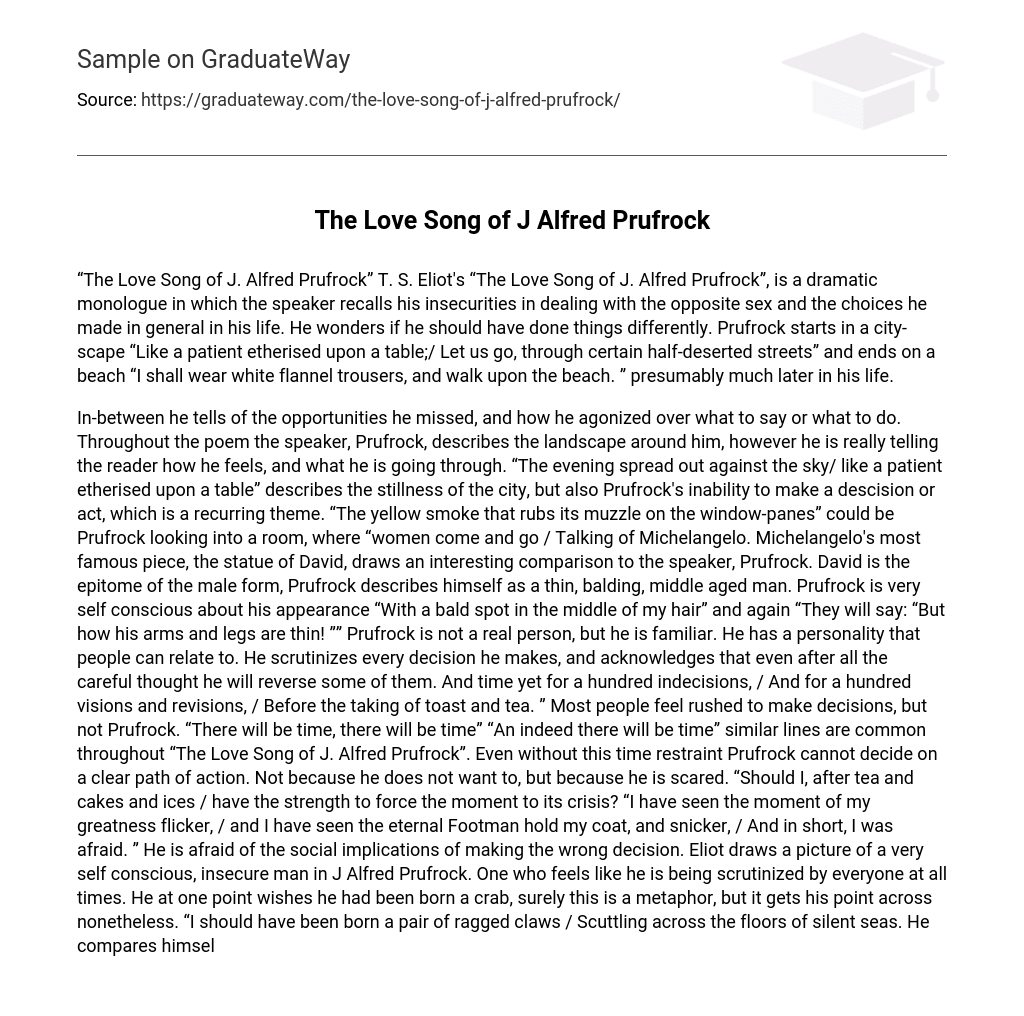“The Love Song of J. Alfred Prufrock” T. S.
“The Love Song of J. Alfred Prufrock” by Eliot is a dramatic monologue where the speaker reflects on his insecurities and regrets in regards to his interactions with women and life choices. The poem begins in a city setting, comparing the speaker to a patient under anesthesia, and later transitions to a beach scene, indicating a significant passage of time. Throughout the poem, Prufrock expresses his internal conflict over missed opportunities and indecision.
The speaker in the poem, Prufrock, describes the surrounding landscape while also conveying his emotions and experiences. For instance, when he says “The evening spread out against the sky/ like a patient etherised upon a table,” he is illustrating the city’s calmness and his own inability to take action. This theme is recurring throughout. Another example is when he mentions “The yellow smoke that rubs its muzzle on the window-panes,” which could represent Prufrock peering into a room where women discuss Michelangelo. Interestingly, Michelangelo’s famous sculpture, David, can be compared to Prufrock. While David represents a perfect male form, Prufrock describes himself as a thin, balding, middle-aged man. Prufrock is quite self-conscious about his appearance, as he mentions “With a bald spot in the middle of my hair” and how others might comment on his thin limbs. Although Prufrock is a fictional character, he feels relatable.
He possesses a relatable personality, carefully considering and recognizing the possibility of reversing his decisions. There is ample time for numerous indecisions, visions, and revisions before enjoying a meal of toast and tea. Contrary to most individuals, Prufrock does not feel rushed when making decisions.
The theme of hesitation and uncertainty is expressed through the repeated lines “There will be time, there will be time” and “An indeed there will be time” in “The Love Song of J. Alfred Prufrock.” Prufrock’s fear prevents him from confidently making a decision, even though he desires to do so. He doubts his ability to seize the opportunity after enjoying tea, cakes, and ices. The loss of potential greatness and the mocking presence of the eternal Footman have left him paralyzed.
Eliot portrays J Alfred Prufrock as a man who is terrified of the social consequences of making the wrong choice. Prufrock is depicted as being extremely self-conscious and insecure, constantly feeling as though he is under intense scrutiny from others. At one moment, he expresses a desire to have been born as a crab, using this as a metaphor to convey his sentiments. He compares himself to an insect pinned to a board for observation, describing himself as “sprawling on a pin” and “pinned and wriggling on the wall.”
The poem’s speaker repeatedly asks himself if he should dare to disturb the universe while alone in a room during a party. He hears voices fading beneath the music from another room and wonders how he should presume. Prufrock reflects on his past decisions and regrets not taking certain actions, questioning whether it would have been worth approaching matters with a smile. However, upon further contemplation, he realizes his intentions would have been misunderstood and exclaims, “That is not it at all! That is not what I meant, at all.” He believes expressing his true intentions accurately is impossible. Even in old age, he continues to question the rightness of his impending actions.
Eliot presents a vivid portrayal of J Alfred Prufrock, a man plagued by self-doubt and insecurity. Prufrock contemplates trivial matters such as how to style his hair and whether he should indulge in a peach. Even when envisioning mermaids, he doubts they would ever sing to him. Throughout “The Love Song of J Alfred Prufrock,” Eliot depicts Prufrock as an ordinary individual who constantly frets over his life choices. From his balding appearance in middle age to his continued bewilderment as an older man, Prufrock continuously questions whether he made the right decisions or if he should have chosen differently. Ultimately, the reader gains substantial insight into Prufrock’s character, perhaps more than he initially intended to reveal.





